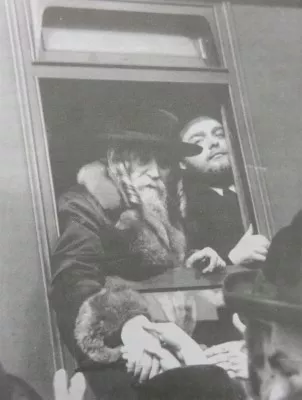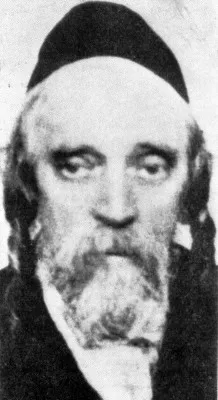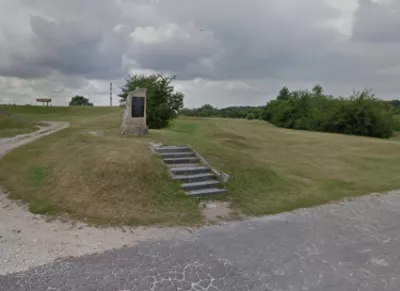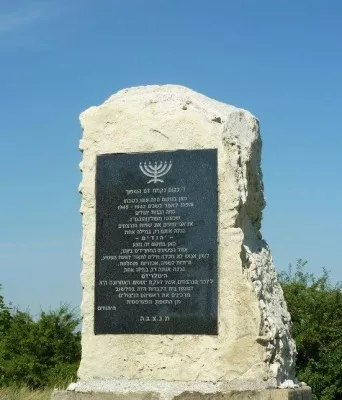Rabbi Shem Kleinberg, May G-d Avenge His Blood
80 Years Since He was Murdered in Sanctification of G-d’s Name
Rabbi Shem Kleinberg was righteous and holy. “The righteous one is the foundation of the universe” (Proverbs 10:25); he was a kabbalist, accepted by the great men of the generation, who appreciated him and his opinions.

His Story:
His father was the grandson of Rabbi Yitzchak Isaac of Komarno, who was a “Sar Beit HaZohar” (well versed in the kabbalistic book of Zohar). His mother was the daughter of Rabbi Moshe Rotenberg, of Skola, also a rebbe of Komarno descent. His rare name, Shem, was given according to the instructions of his grandfather, Rabbi Isaac, who said that on Rosh Hashanah of the year of his birth, Shem the son of Noah spoke in defense of the People of Israel, and because of this Rabbi Isaac promised that the first baby born to his family would be named after him. Rabbi Isaac died when Rabbi Shem was 4 years old, but he remembered his character. He studied mainly with his father. He was ordained to teach by the rabbi of Krakow, Rabbi Chaim Leibush Horwitz. He married Shlomtzeh, daughter of Rabbi Yisrael Horwitz, the rabbi of Wiszlica, from the Linsk dynasty.

After his marriage, he was very diligent, and daily schedule consisted of the Vatikin prayer service, study until midday, the Shacharit morning prayers, the Mincha afternoon prayers, and studying with students until half past nine in the evening, when he went to dine at his father-in-law’s, and then continued to study at his home until late. In the manner of the rebbes of Komarno, he was engaged in the secret Torah (the Kabbalah), and at the age of 30 he could repeat the Ari’s (ancient kabbalistic rabbi) book, Likutei HaShas. His father passed away in 5678 (1918) and prior to his death, Rabbi Shem was appointed to replace him.
He based his study path in Kabbalah on the path of Rabbi Tzvi Elimelech Shapira of Dinow, and also extensively studied the commentary of the Gra (the genius, Rabbi Eliyahu – also known as the Vilna Gaon) on the Zohar. In his home there were 800 books of Kabbalah and Chasidism and about 1,500 books on the Talmud, Halacha (Jewish law) and responsa, all full of notes and annotations. He composed a commentary on the Zohar and on all its parts (new Zohar, Revisions, Safra Detzniuta, etc.), but his father-in-law, the “Imrei Emet” of Gur, told him not to print it because the generation is not fit to accept such a book (the generation was not suitable). He also composed an essay on the 22 letters of the Hebrew alphabet, in which the the letter alef (the first letter) alone had a thousand entries. A few of the Torah lessons that survived the Holocaust were printed by his son in the year 5721 (1961) in the book “Ohalei Shem”.
He was also involved in bringing together broken Jews, and every day when he came home, poor Jews were waiting for him to receive encouragement . Sometimes his heart would weaken to the point where he had to take medication. He also distributed large sums to charity, and refused to take a larger payout than the giver could afford. He did not get involved in public activities, but was inclined towards the Agudath Israel movement (Wikipedia).
In the Holocaust Period
Near the outbreak of the war, he appealed to the great men of the nation to do everything to prevent the decree. The Gerrer Rebbe, the Imrei Emet, addressed him personally and said that he was ready to do whatever Rabbi Shem told him to do, but it was already too late. When the Nazis entered Krakow, the rabbi fled to the nearby Niepolomice where he hid for about two years until he was forced to move to the Krakow Ghetto, where he continued his regular classes in a bunker. Months later, a there was a deportation to the Plaszow camp. . At that point, the rabbi stopped singing hymns on Shabbat, saying: “Israel is drowning in the sea and you are singing?!”.
His son, Moshe, told that he once managed to sneak in and visit his father in the camp and heard from him words of Torah about the verse in Psalms 73: “Until I came to the sanctuaries of G-d, and I understood their end.” The rabbi explained: “When the Messiah comes, then I will understand the secret of leadership, the secret of murders and slaughters.” At the same time, he was very careful not to let any hint be heard from his words that he was pondering the law of Heaven. On Purim in the year 5703 (1943), the rabbi arranged for a Megilla reading in the camp, and he himself distributed gifts to the poor: a slice of bread, groats, or crumbs of vegetables.
On Passover, matzah was smuggled into the camp for the rabbi of Bochnia, risking their lives, and he even managed to hold a Seder and recite the Hagada by heart. After Passover, a selection was held in the Plaszow camp, and the Rebbe was taken to the killing field. His followers attempted to save him and indeed he was returned to the camp for a while, but was immediately taken away again. Before the execution, he begged his killers to bring him a pair of tzitzit (the traditional frocks that Orthodox men wear). At first the Nazi officer was filled with rage and shouted: “Jewish insolence!” However, after that he allowed a kapo to fulfill the rabbi’s wish and he brought him the tzitzit. The Rebbe put it on, said the confession prayer and shouted: “Let me be the atonement for the People of Israel,” and he continued by calling out: “Hear Oh Israel, the L-rd our G-d, the L-rd is One,” and was immediately shot by the murderers. According to the son’s testimony, this occured on Nisan 28, 5703 (May 3, 1943).
(Zachor; Rabbis Who Perished in the Holocaust)

The spot where the rabbi was shot and killed
During these troubled days, our rabbi distributed a lot of charity, strengthened the oppressed Jews and encouraged them to be willing to give their lives for the sanctification of G-d’s Name, and even then he did not stop his holy work. At the lighting of his Chanuka candles, only two people were present as due to the terror of the oppressors, no chassidim came, and he shed tears like water and recited Torah for an hour and a half, saying: “Why do I recite the Torah in front of people? After all, before the Shechina (G-d’s presence), I speak, in honour of the sanctity of the Chanuka candles!”
Once his son, Rabbi Moshe z”l, asked him, if there was noone in their generation who would be willing to be the atonement for Israel in the way that Rabbi Tzvi Hirsh of Zidichov, the author of the Ateret Tzvi did in the days of the children’s plague, when he laid his hand on the mezuzah and he said, “Let me be the atonement for the People of Israel,” and the plague stopped. Rabbi Shem replied to his son: “Many were ready for this, except that not everyone receives such a gift from Heaven to deserve it!”
Bitter and difficult days passed, and in the meantime the decree arose that all the Jews of the towns should move to the big cities, and the rabbi was once again forced to return to living within the walls of the Krakow Ghetto. When we were informed of this bitter news, he turned around holding the thought for a long time with a pale face, and then he said: “Well, Rabbi Eliezer says: Again one day before your death!”
The rabbi was smuggled into the ghetto walls thanks to the devotion of his followers. The separation from the town’s Jews was shocking. The rabbi opened the Torah ark and parted with the Torahs with a great cry, asked them for forgiveness, and begged them to vouch for the People of Israel before the Divine throne, and the whole audience fell into bitter and heartbreaking tears. In the same episode he stopped singing hymns on Shabbat, and he said: “Israel is drowning in the sea and you are singing?!”. But he did not stop from his regular classes openly and secretly for even a single day. During his stay in the underground bunker he behaved as usual and continued his holy service with supreme devotion. In those days, he inspired the Jews that they should have mercy on their neighbours and act with kindness to them; he did this to soften the laws they faced, and he himself served as a symbol and example. Wonderful legends were woven in the ghetto around his acts of kindness in the past.
A few months later, Rabbi Shem was transferred to the Plaszow concentration camp, which is one of the deepest sections of hell within hell. So the tyrants separated our rabbi from his son Rabbi Moshe z”l, who from the day he was born and until then had not separated from his father. They sent his son to the nearby Kawel camp. One day a gentile brought Rabbi Moshe a letter from his brother Rabbi Isaac’el informing him that his mother and sisters “need great mercy”. A few days later, Rabbi Moshe received another letter from his father in which he informed him of the murder of his mother and his sisters by the cursed Nazis with modest and pure self-sacrifice that took place on the 24th of Adar 2 (some years have two months of Adar), the anniversary of death of Rabbi Weislitz z”l, and asked him to learn Mishna and say Kaddish in their memories. Moshe could not resist and snuck into the Plaszow camp and stayed in the presence of his father for all of Shabbat. At the time of the third Shabbat meal (in the late afternoon), Rabbi Shem began and said: God said “Until I came to the sanctuaries of G-d, and I understood their end,” that is, when our righteous Messiah comes I will understand the secret of the supreme leadership in this period, the secret of the murders and slaughters. He did not add any more and refused to talk about the situation, he kept himself from thinking about the law of Heaven and accepted everything with love.
Even there, on the brink of death, he continued his holy work, in the way of “Behold, let them kill me” (Job 13:15), and on the holiday of Purim he arranged the reading of the Megillah and with his own hands distributed gifts to the poor, one a slice of bread and the other a handful of groats or vegetable crumbs.
During Passover, the situation worsened. Every day, selections were made and Jews were led to their slaughter. Rabbi Shem was admitted to the hospital due to his weak state of health, but the remaining Jews continued to bask in his light. From the Bochnia Ghetto, matza was smuggled into the camp, at risk to their lives, and on the night of Seder, our Rabbi sat and recited the Haggada by heart, sitting in a dark room. A handful of broken Jews gathered around him and he fed them spirituality, and strengthened them with the notion that G-d’s salvation would come in the blink of an eye and they would have the privilege of hearing the bells of the messiah. He continued to encourage them by saying that now, in the midst of the vile oppressors, he understood with such great clarity the deep meaning of the blessing “that I was not made a gentile”.
In the last month of his life, people came to him on Shabbat and told him that Torah scrolls and their ornaments had been desecrated. He wept profusely and shouted: “What sin did the Torah scrolls commit?!” And they saw that he was shocked to the point of depression due to the desecration of holy objects.
The 28th day of Nisan 5703 (May 3, 1943) was the bitter day when the despicable Nazi murderers took out our Rabbi and chose him to be executed by firing squad in front of the whole congregation of sheep from his dying flock. It was a supreme and sublime status of sanctifying the Name of G-d in a time of fear. When his followers learned that the decree had been passed, they burst out in tears that reached the heavens as their world darkened before them, and they could not see the evil that would overtake them. It is true that our rabbi calmed them down and begged them that they would receive Heaven’s judgment with love and joy. Our rabbi was stripped of his clothes, but asked his executioners for permission to remain wearing his tzitzit and jacket to say the confessional prayer. A sign was then made to him that his wish had been fulfilled, so the pure and holy rabbi ascended higher and higher, to the summit of santifying the Name of G-d, and it was visible and obvious that he ascended elevation after elevation in his lofty thoughts and his fiery face. Finally, he shook himself off in the blink of an eye, took a last look and with great compassion towards his fellow Jews, raised his eyes to Heaven and called out a sky-splitting exclamation, “Let me be the atonement for the People of Israel”, and asked the murderers of the Jewish Community to give him the opportunity to say the confessional prayer, and when he finished, he covered his face with the tzitzit and shouted “Hear Oh Israel, the L-rd our G-d, the L-rd is One.” At that time, our Rabbi was full of thoughts and his face was radiant with a wonderful radiance that did not hide the decree at all, and in that place he was shot by the impure murderers. This is how the “cedar of Lebanon” was cut down, the mouth that produced words of wisdom licked the dirt, and G-d rejoiced that a pure and righteous soul joined him, as it is written “I will be santified by those near to Me.”
(On the Righteous and on the Chassidim – Yiddishe Velt)
The mass grave in Plaszow in which Rabbi Shem Kleinberg z”l is buried















